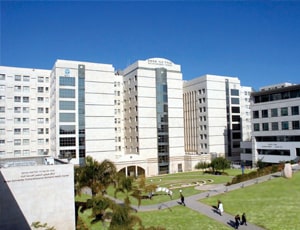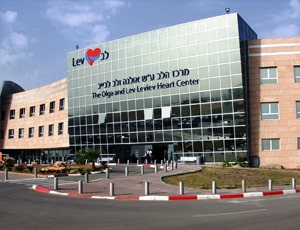The average cost of Epilepsy Treatment in Petah Tikva approximately starts from USD 1903
Treatment cost

Rabin Medical Center located in Petah Tikva, Israel is accredited by JCI. Also listed below are some of the most prominent infrastructural details:


Sheba Medical Center located in Tel-Hashomer, Israel is accredited by JCI. Also listed below are some of the most prominent infrastructural details:
If you've been diagnosed with epilepsy, there are a few options for management and treatment of this condition. These include medication, a specific diet, a nerve or brain implant, and surgery may all be used to help you feel better.
Regular follow ups are required in case of both medications and when neurostimulators are implanted to see whether they are working well to manage the epilepsy treatment.
When you get surgery done as an epilepsy treatment, the majority of postoperative swelling and discomfort goes away after a few weeks. You will most likely be unable to return to school or work for one month to three months (on average). Post-epilepsy procedure, you must relax and recuperate for a few weeks before steadily increasing the level of activity.
Medication for Seizures: Your doctor will most likely recommend that you try this first. It helps around seven out of ten patients with epilepsy. Epilepsy medications, often known as anti-seizure or anticonvulsant drugs, alter the way your brain cells communicate with one another.
Ketogenic Diet: This diet is low in carbs and rich in fats and is based on seizure classification. It should be doctor recommended as well as in consultation with a dietitian.
Stimulation of the Nerves: Vagus nerve stimulation: A tiny device called a vagus nerve stimulator will be implanted beneath the skin of your chest and connected to the nerve by your doctor. The gadget transmits tiny bursts of electricity to your brain through the nerve. You'll almost certainly need to continue taking medicine. A neurologist can modify this device throughout your visits to discover the settings that work best for you. It is not suitable for everyone.
Responsive neurostimulation: A tiny device called a neurostimulator is surgically implanted as part of this treatment. It's implanted beneath the surface of your skull by your doctor. It searches for seizure-inducing patterns in your brain activity. When the neurostimulator detects one of these patterns, it interrupts it with a little pulse. This gadget is not available to everyone; eligibility is determined by the kind of epilepsy.
Surgical Resection: The portion of your brain that produces the seizures will be removed by the surgeon. When the region of the brain generating the seizures is tiny, with well-defined borders, and does not regulate things such as speech, movement, vision, or hearing, this operation is most commonly performed.
Disconnective Surgery: Rather than removing a section of your brain, the surgeon will sever the pathways between the brain nerves that cause your seizures.
Complications and risks of various kinds of epilepsy treatment:
Tiredness, stomach upset or pain, dizziness, or blurred vision are some of the frequent adverse effects that might occur in the first few weeks of using seizure medications.
Complications of the Vagus Nerve Stimulation:
Complications of Responsive Neurostimulation:
There are dangers connected with responsive neurostimulation since it requires brain surgery to place the device. Following brain surgery, there is a slight chance of infection, bleeding, discomfort, and neurological damage.
Complications of Epilepsy Surgery:
The most frequent kind of epilepsy surgery is the excision of part of the temporal lobe. Potential complications of this surgical procedure involve difficulties with memory, a partial vision impairment, depression or even other emotional disorders. Such dangers usually differ from one person to the next, and in certain situations, they may only be transitory.
Ask your healthcare adviser for the best multiple options and choose the one that meets your expectations
The cost of Epilepsy Treatment in Petah Tikva starts from $1903. Epilepsy Treatment in Petah Tikva is conducted across several JCI certified hospitals.
Epilepsy Treatment cost in Petah Tikva varies from one hospital to the other. Some of the best hospitals for Epilepsy Treatment offer a comprehensive package that covers the end-to-end expenses related to investigations and treatment of the patient. The Epilepsy Treatment cost in Petah Tikva includes the cost of anesthesia, medicines, hospitalization and the surgeon's fee. There are many things that may increase the cost of Epilepsy Treatment in Petah Tikva, including prolonged hospital stay and complications after the procedure.
Many hospitals in Petah Tikva perform Epilepsy Treatment. Some of the most renowned hospitals for Epilepsy Treatment in Petah Tikva include the following:
After discharge from the hospital, the patient has to stay for another 18 days in the country for complete recovery. This period is important to conduct all the follow-up tests to ensure that the surgery was successful and the patient can go back to the home country.
Petah Tikva is one of the most popular cities for Epilepsy Treatment in the world. The country offers the best cost of Epilepsy Treatment, best doctors, and advanced hospital infrastructure. However, some of the other popular destinations for Epilepsy Treatment include the following:
There are certain expenses additional to the Epilepsy Treatment cost that the patient may have to pay for. These are the charges for daily meals and accommodation outside the hospital. The per day cost in this case may range from 75 USD.
After the Epilepsy Treatment surgery takes place, the average duration of stay at the hospital is about 3 Days. During the recovery, the patient is carefully monitored and control tests are performed to see that everything is okay. If required, physiotherapy sessions are also planned during recovery in hospital.
Out of all the hospitals in Petah Tikva, there are about 1 Hospitals best hospitals for Epilepsy Treatment in Petah Tikva. These hospitals have the required infrastructure and a decided Epilepsy Treatment unit where renal failure patients can be treated. Also, these hospitals follow the necessary guidelines as required by the medical associations for the treatment of Epilepsy Treatment patients.
Some of the most sought after doctors for Epilepsy Treatment in Petah Tikva are: